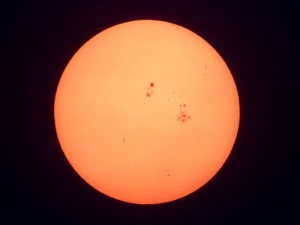News sources are publishing information regarding new scientific research which puts our sunspot cycle into question. How does this affect the average shortwave listener? Periods of high sunspot numbers generally produce excellent DX conditions. In other words, with modest equipment, listeners can hear even weak signals around the world. Amateur radio operators find that they can communicate around the world with very low power.
Our current cycle (cycle 24) has been relatively uneventful compared to the past–but the prediction for Cycle 25 is scary. Indeed, it may not even happen on schedule. The news sources below explain in detail.
Spaceref.com:
A missing jet stream, fading spots, and slower activity near the poles say that our Sun is heading for a rest period even as it is acting up for the first time in years, according to scientists at the National Solar Observatory (NSO) and the Air Force Research Laboratory (AFRL).As the current sunspot cycle, Cycle 24, begins to ramp up toward maximum, independent studies of the solar interior, visible surface, and the corona indicate that the next 11-year solar sunspot cycle, Cycle 25, will be greatly reduced or may not happen at all.
From Yahoo:
For years, scientists have been predicting the Sun would by around 2012 move into solar maximum, a period of intense flares and sunspot activity, but lately a curious calm has suggested quite the opposite.According to three studies released in the United States on Tuesday, experts believe the familiar sunspot cycle may be shutting down and heading toward a pattern of inactivity unseen since the 17th century.
Science Mag:
Things may be about to get very dull on the sun. Three different measurements of solar activity, reported by scientists at a press conference today, suggest that the next 11-year-long solar cycle will be far quieter than the current one. In fact, it may not happen at all: Sunspots, the enormous magnetic storms that erupt on the sun’s surface as the cycle builds, might disappear entirely for the first time in approximately 400 years.




